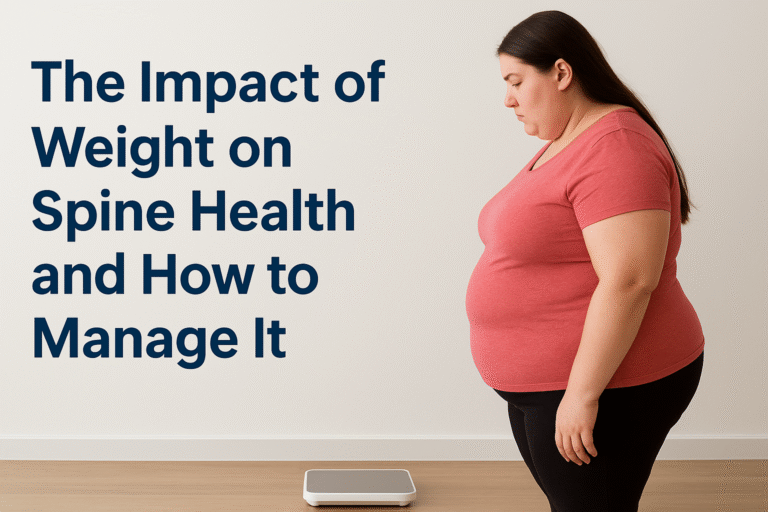Maintaining a healthy spine is essential for overall well-being, but many people overlook one of the most important factors influencing spinal health—body weight. Excess weight adds significant stress on the spine, increasing the risk of back pain, disc degeneration, and even spinal deformities. As an orthopaedic spine surgeon, I frequently see patients whose spinal conditions are closely linked to being overweight or obese.
This article explores how weight impacts the spine and practical ways to manage it effectively.
How Excess Weight Affects Spine Health
-
Increased Pressure on Discs
The spine’s intervertebral discs act as cushions. Extra body weight—especially around the abdomen—puts more strain on these discs, making them prone to wear and tear, herniation, or bulging.
-
Spinal Misalignment
Excess abdominal fat can shift the body’s center of gravity, leading to poor posture. Over time, this misalignment may cause chronic back pain or spinal deformities.
-
Higher Risk of Degenerative Conditions
Overweight individuals are at greater risk of conditions such as degenerative disc disease, osteoarthritis, and sciatica, which can severely impact mobility and quality of life.
-
Reduced Flexibility and Mobility
Carrying excess weight limits movement, weakens core muscles, and makes the spine less stable, increasing the likelihood of injury.
How to Manage Weight for Better Spine Health
-
Adopt a Balanced Diet
Focus on nutrient-rich foods: lean proteins, whole grains, fruits, vegetables, and healthy fats. Avoid processed foods and excess sugars that contribute to weight gain.
-
Incorporate Regular Exercise
Low-impact exercises such as walking, swimming, cycling, and yoga help strengthen back and core muscles while supporting weight loss.
-
Strengthen Core Muscles
A strong core reduces spinal strain and provides better stability. Simple exercises like planks and bridges can make a big difference.
-
Maintain Proper Posture
Correct posture while standing, sitting, and lifting reduces spinal stress and helps prevent pain.
-
Seek Professional Guidance
If back pain persists despite lifestyle changes, consult an spine specialist. Early evaluation can prevent progression of spinal problems.
FAQs
Q1: Can losing even a small amount of weight help with back pain?
Yes. Even a modest weight loss can reduce pressure on the spine and joints, significantly easing back pain and improving mobility.
Q2: What type of exercise is safest for overweight individuals with back pain?
Low-impact exercises like swimming, water aerobics, and stationary cycling are gentle on the spine while promoting weight loss.
Q3: Does obesity increase the risk of spine surgery?
Yes. Obesity not only increases the chances of requiring spine surgery but may also complicate recovery. Managing weight can reduce these risks.
Q4: How can I know if my back pain is weight-related or due to another condition?
Consulting an orthopaedic spine surgeon is the best way to get an accurate diagnosis through clinical evaluation and imaging tests.
Conclusion
Excess weight plays a major role in spinal health, often leading to chronic pain and degenerative conditions. The good news is that lifestyle modifications—healthy eating, regular exercise, and proper posture—can significantly reduce spinal stress.
If you are experiencing persistent back pain, early evaluation by an spine surgeon can provide targeted solutions for long-term spine health.

